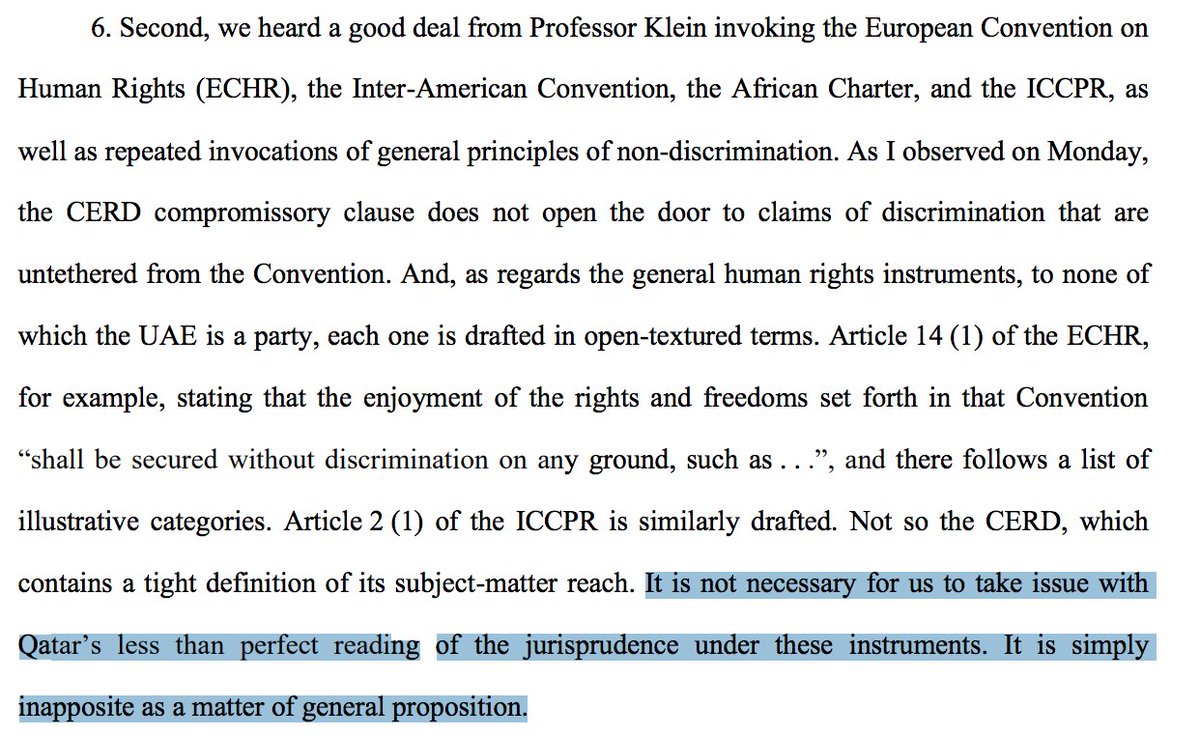A supremely niche law of treaties point touched upon obliquely in the last week’s @CIJ_ICJ Qatar v UAE judgment: what is the place of unrelated treaties on the same topic (pari materiae) within the principles of treaty interpretation reflected in VCLT arts 31-32? 1/n https://twitter.com/CIJ_ICJ/status/1357349417997770753
A key question in the case was whether the term ‘national origin’ in ICERD art 1(1) encompassed current nationality. Both parties referred to regional human rights instruments in their arguments. The Court said two things on this: 2/n
Let's assume that, unlike [104], purpose were the same and the regional jurisprudence would be of great help: what is the VCLT argument for the content of UAE’s obligations being established by reference to three regional treaties it is not a Party to? 3/n
To recall, the Court says this in explaining the role of regional treaties and associated practice: 4/n
If we trace back references, 1st is not obviously on point – Diallo Compensation is about identification of custom not interpretation of treaties – and the 2nd, 4th are about the practice of human rights committees to the particular treaty, so it just Diallo Merits [68] (?): 5/n
What is Diallo [68] in VCLT terms? ‘[I]s consistent with’ – ‘est en cohérence avec’ in original FR – is not entirely like the first leg of VCLT art 32 – ‘in order to confirm’/ ‘soit de confirmer’ – but also not entirely unlike it, so perhaps this is (unenumerated) VCLT art 32 6/n
But Qatar v UAE less easily compatible with VCLT art 32 – [76] sets out in turn 31 and 32, and [77] kicks off with promise to ‘also examine’, which seems more consistent with these authorities NOT falling under VCLT 32 (cf. [77] beginning with ‘among other materials, …’.) 7/n
On a quick look, the only Judge to engage with regional human rights was Judge Iwasawa. This is what he said, agreeing with the principle of [77] and finding it to be satisfied – regional human rights treaties are relevant – but not saying anything on VCLT characterisation 8/n
Do the pleadings get us further? In Qatar’s statement on preliminary objections, regional human rights cases were introduced as relating to ordinary meaning, context, and object and purpose, all VCLT art 31 (and indeed 31(1)) materials. 9/n
In the oral pleadings, the issue was discussed between Klein (Qatar) and Bethlehem (UAE). Bethlehem first says that Qatar tries to bring treaties to which UAE is not a party via custom: 10/n
Klein responds that Qatar is simply demonstrating the ordinary meaning of commonly used provisions, with a nod to Diallo [68] – a rather brave reading of Diallo’s almost P.S. nod to regional courts. 11/n
Bethlehem retorts thus, leaving open what that general proposition is: is it that such materials are not relevant in principle because UAE is not a Party? Or is it that the drafting of the particular instruments makes examination of associated jurisprudence unnecessary? 12/n
And this is Klein’s final point, again with a nod to Diallo: does one sense a qualified departure on the VCLT point, with ‘clarification’ closer to VCLT art 32 and a bit weaker than establishment of the ordinary meaning at the core of art 31 presented earlier? 13/n
My first reading was that the Court treated unrelated treaties on the same topic as one of VCLT art 32 unenumerated materials, which, while hinted at in Diallo, would still be a Fairly Big Deal, accepting entirely unrelated regional treaties into admissible materials. 14/n
The unenumerated box has been filling up pretty solidly over the last 30 years, with pari materiae treaties & treaty conclusion-related materials by one party, and subsequent practice not rising to art 31 all offered -- but unrelated pari materiae would go much further 15/n
But upon reflection, seems no bigger point, more due to admissibility and weight of materials presented together in oral pleadings, indirectly confirmed by lack of comment in individual opinions which one might have expected at least from people with governmental experience. 16/n
P.S. Ofc, pari materiae treaties may in particular circumstances be presented, as Klein did, as reflecting ordinary meaning, or as circumstances of conclusion, but Qatar v UAE seemed close to the general question, although, in my view, despite appearances it did not. FIN.

 Read on Twitter
Read on Twitter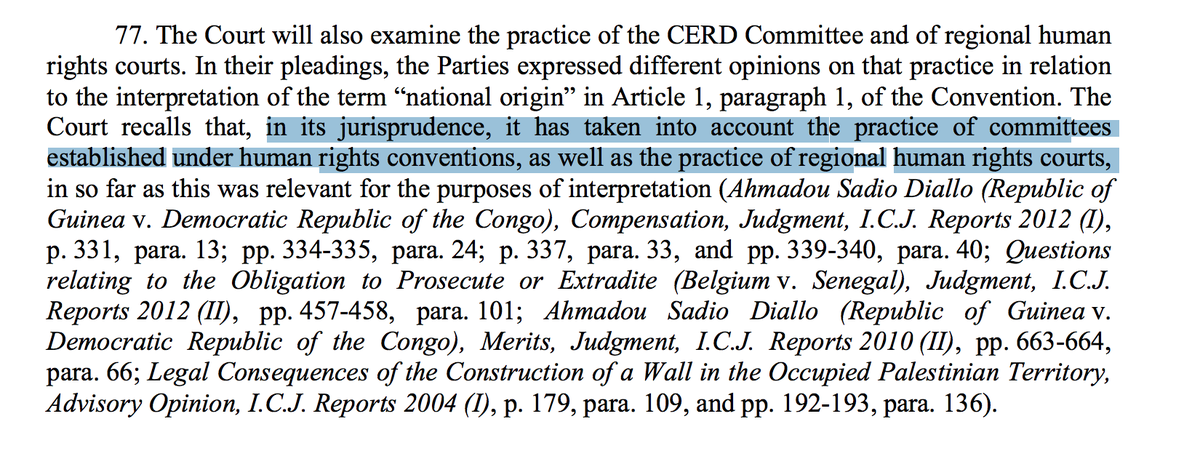
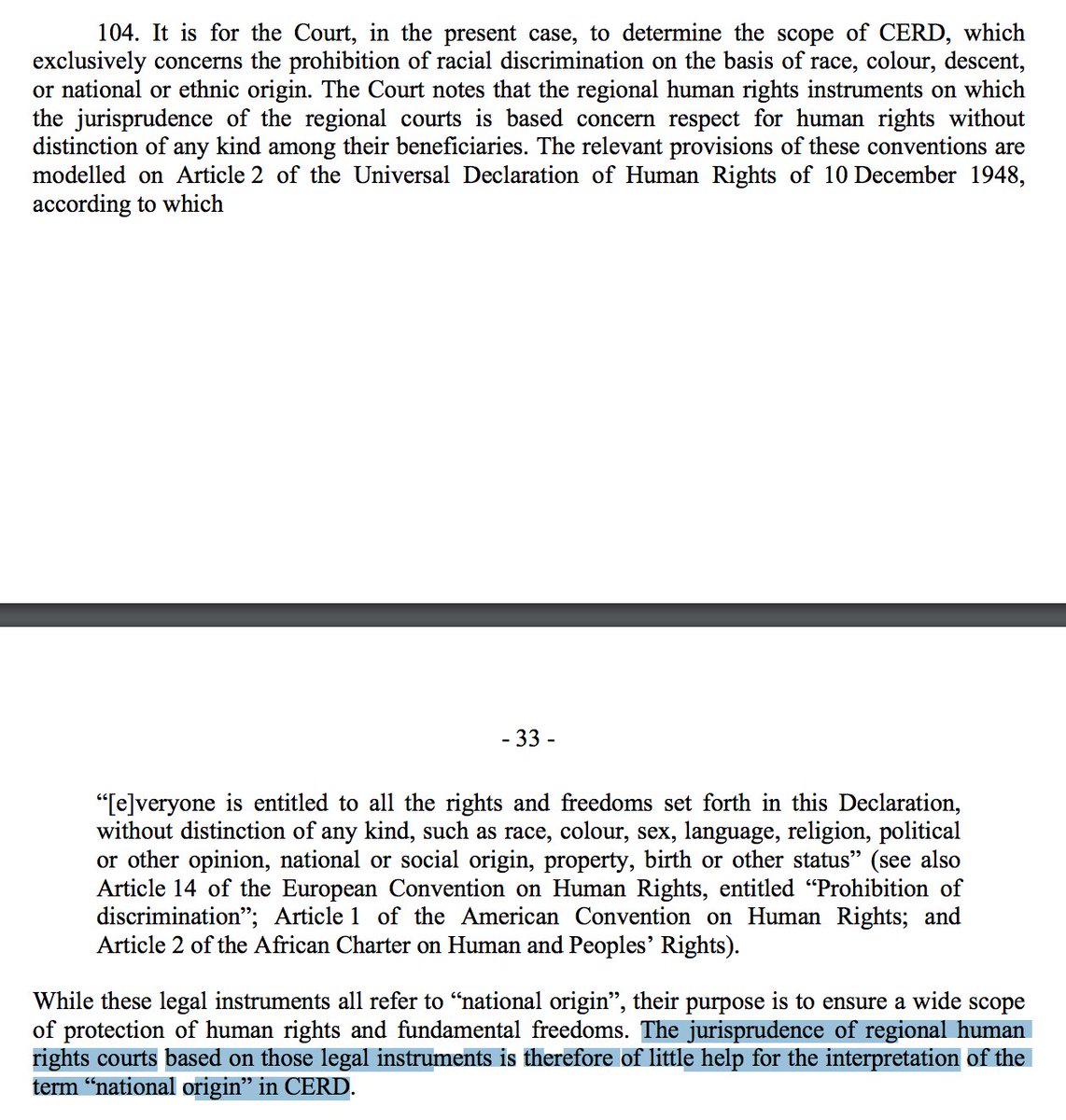
![Let's assume that, unlike [104], purpose were the same and the regional jurisprudence would be of great help: what is the VCLT argument for the content of UAE’s obligations being established by reference to three regional treaties it is not a Party to? 3/n Let's assume that, unlike [104], purpose were the same and the regional jurisprudence would be of great help: what is the VCLT argument for the content of UAE’s obligations being established by reference to three regional treaties it is not a Party to? 3/n](https://pbs.twimg.com/media/Et8f1LIWQAUzBy6.jpg)
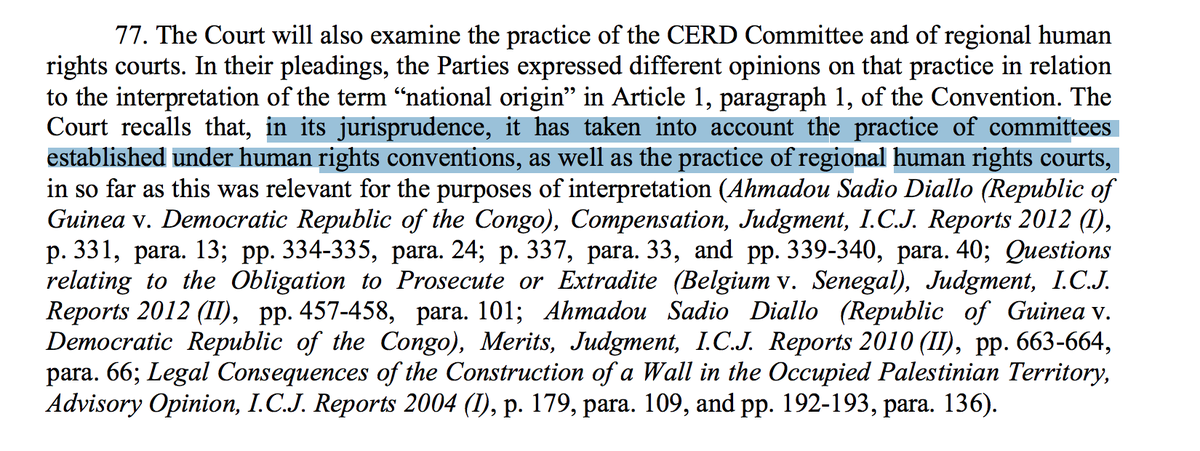
![If we trace back references, 1st is not obviously on point – Diallo Compensation is about identification of custom not interpretation of treaties – and the 2nd, 4th are about the practice of human rights committees to the particular treaty, so it just Diallo Merits [68] (?): 5/n If we trace back references, 1st is not obviously on point – Diallo Compensation is about identification of custom not interpretation of treaties – and the 2nd, 4th are about the practice of human rights committees to the particular treaty, so it just Diallo Merits [68] (?): 5/n](https://pbs.twimg.com/media/Et8hMpbXUAAHu29.png)
![What is Diallo [68] in VCLT terms? ‘[I]s consistent with’ – ‘est en cohérence avec’ in original FR – is not entirely like the first leg of VCLT art 32 – ‘in order to confirm’/ ‘soit de confirmer’ – but also not entirely unlike it, so perhaps this is (unenumerated) VCLT art 32 6/n What is Diallo [68] in VCLT terms? ‘[I]s consistent with’ – ‘est en cohérence avec’ in original FR – is not entirely like the first leg of VCLT art 32 – ‘in order to confirm’/ ‘soit de confirmer’ – but also not entirely unlike it, so perhaps this is (unenumerated) VCLT art 32 6/n](https://pbs.twimg.com/media/Et8hczsXEAEulHg.png)
![But Qatar v UAE less easily compatible with VCLT art 32 – [76] sets out in turn 31 and 32, and [77] kicks off with promise to ‘also examine’, which seems more consistent with these authorities NOT falling under VCLT 32 (cf. [77] beginning with ‘among other materials, …’.) 7/n But Qatar v UAE less easily compatible with VCLT art 32 – [76] sets out in turn 31 and 32, and [77] kicks off with promise to ‘also examine’, which seems more consistent with these authorities NOT falling under VCLT 32 (cf. [77] beginning with ‘among other materials, …’.) 7/n](https://pbs.twimg.com/media/Et8i70gXcAMCaPE.png)
![On a quick look, the only Judge to engage with regional human rights was Judge Iwasawa. This is what he said, agreeing with the principle of [77] and finding it to be satisfied – regional human rights treaties are relevant – but not saying anything on VCLT characterisation 8/n On a quick look, the only Judge to engage with regional human rights was Judge Iwasawa. This is what he said, agreeing with the principle of [77] and finding it to be satisfied – regional human rights treaties are relevant – but not saying anything on VCLT characterisation 8/n](https://pbs.twimg.com/media/Et8jTatWQAAUFf4.jpg)

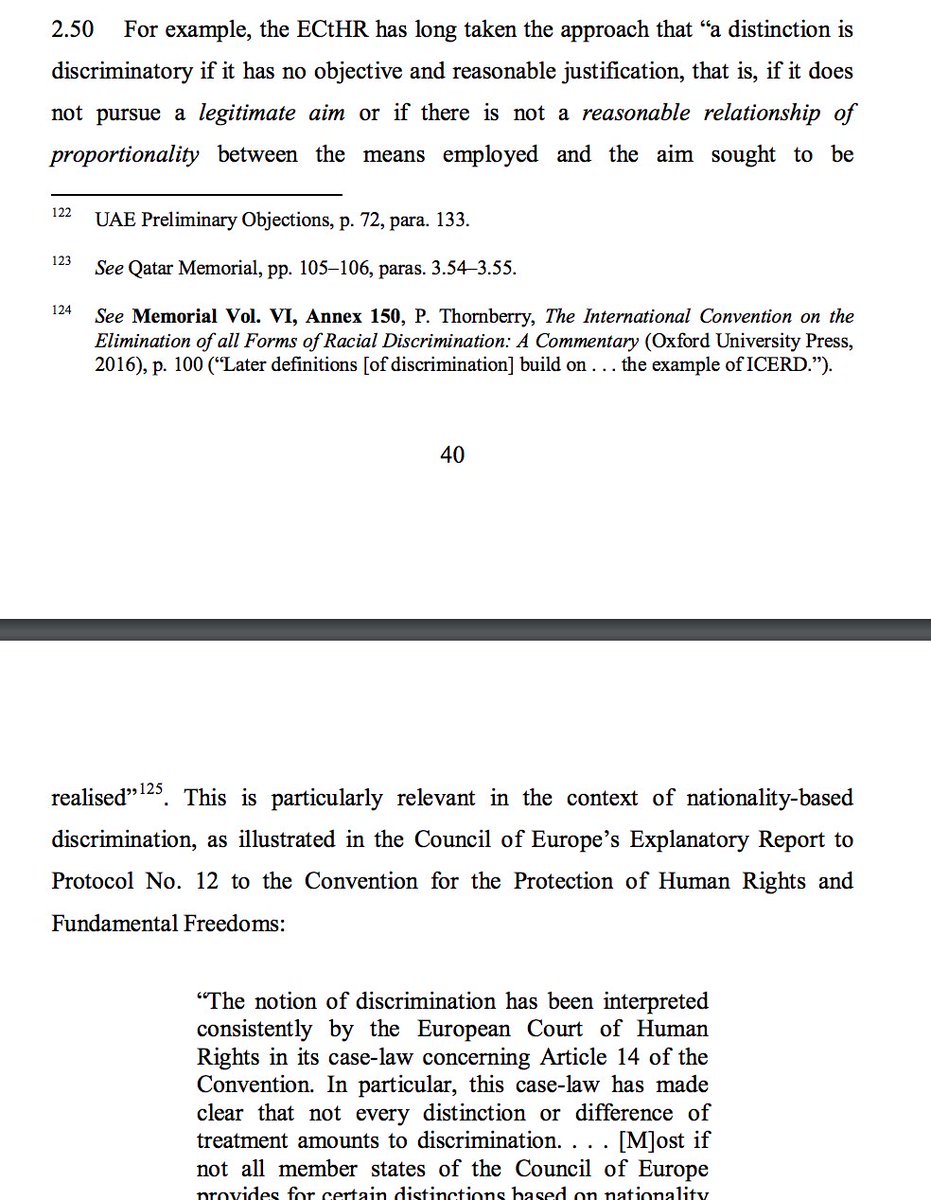


![Klein responds that Qatar is simply demonstrating the ordinary meaning of commonly used provisions, with a nod to Diallo [68] – a rather brave reading of Diallo’s almost P.S. nod to regional courts. 11/n Klein responds that Qatar is simply demonstrating the ordinary meaning of commonly used provisions, with a nod to Diallo [68] – a rather brave reading of Diallo’s almost P.S. nod to regional courts. 11/n](https://pbs.twimg.com/media/Et8kPCMXMAA6l2p.jpg)
